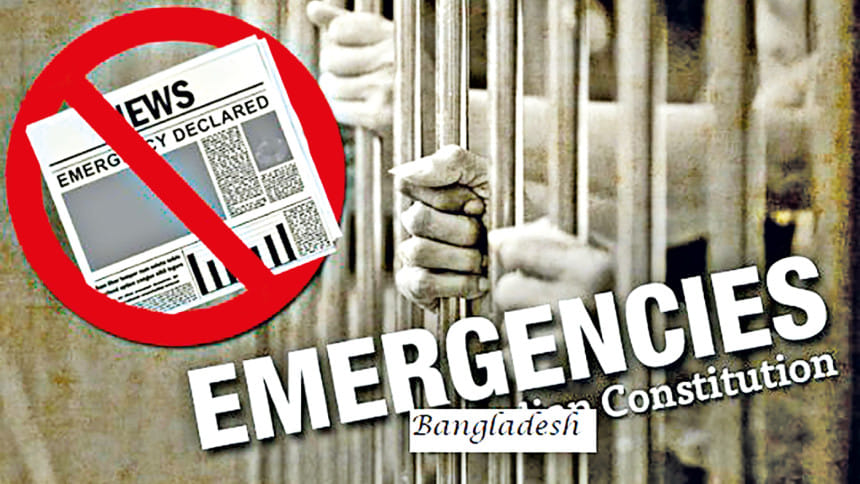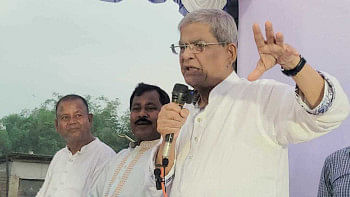Emergency provisions in Bangladesh constitution

A common feature of almost every democratic Constitution in the world is the inclusion of detailed provisions concerning proclamation of emergency to overcome an imminent threat to the life of nation by war, external aggression, armed rebellion, internal disturbances, natural catastrophes, and economic breakdown. The concept of emergency, from the viewpoint of constitutional law, means the suspension of and restriction over certain fundamental rights of citizens in order to deal with an extraordinary situation when the security of the State is threatened or the national interest is in peril.
The Constitution of Bangladesh did not originally contain any provision for the declaration of an emergency. As such there was no provision in the Constitution concerning the suspension of the enforcement of fundamental rights under any circumstances. Perhaps the repeated misuse of the powers of emergency by Pakistan, during the days when Bangladesh was part of Pakistan, discouraged the framers of the 1972 Constitution from including in it such powers. Later, a new Part IXA titled 'Emergency Provisions' was inserted by the Constitution (Second Amendment) Act, 1973. This Part contains only three Articles: Articles 141A, 141B and 141C.
The President may, with the prior counter signature of the Prime Minister, declare emergency in his satisfaction, if there exists a grave emergency that threatens the security or economic life of Bangladesh or any part of it, whether by war, external aggression, or internal disturbance. A proclamation of emergency may be made even before the actual occurrence of war, external aggression or internal disturbance if the President is satisfied that there is imminent danger thereof.
Emergency provisions were inserted in the Constitution of Bangladesh to protect the State in time of war or external aggression or internal disturbance or to protect the security or economic life of Bangladesh. Later, these provisions were misused.
According to the provisions of Article 141B, if the President declares a state of emergency, certain fundamental rights shall automatically be suspended including those guaranteeing freedom of movement, freedom of assembly, freedom of association, freedom of thought and speech, freedom of profession or occupation, and rights to property. This means that the enjoyment of those fundamental rights remains restricted during the emergency period, and no citizen can demand the benefit of those rights until the proclamation of emergency is revoked by a subsequent proclamation.
A declaration by the President under Article 141C suspends enforcement of such fundamental rights as are mentioned in the declaration. Thus, this Article violates the Article 44 of the Constitution which deals with the enforcement of fundamental rights. Furthermore, under Article 102 of the Constitution, an aggrieved person cannot approach the court even when their fundamental rights are violated.
Since Article 141B empowers the executive to take any action, it can utilise this power even to violate fundamental rights contained in the Constitution. The rules made and actions taken cannot be challenged on the ground that they are inconsistent with fundamental rights. This power of executive goes against the balance of power among the judiciary, executive and legislature.
During the period of emergency, the Parliament can make any law which is inconsistent with the fundamental right as contained in part III of the Constitution. Thus, the Article 26 which limits the State's power to make any law inconsistent with fundamental rights is violated. The law made cannot be questioned in any court. Thus, the Parliament exercises an unfettered power in making laws at the time of emergency without any fear of judicial interference.
Emergency provisions were inserted in the Constitution of Bangladesh to protect the State in time of war or external aggression or internal disturbance or to protect the security or economic life of Bangladesh. Later, these provisions were misused.
To prevent the abuse of emergency powers, a specific definition of 'internal disturbance' should be inserted into our Constitution. The detainee should be given all reasonable legal opportunities to immediate and regular access to a lawyer, family members and an unbiased medical board. The Supreme Court can order the payment of compensation to the person arrested illegally or intentionally at the time of emergency as in the case of Bilkis Akhter Hossain v Bangladesh and others, (1997) .
In times of emergency, the Judiciary has played some crucial roles in protecting citizen's liberty and property rights. In the case of Nurunnahar Begum v Government of Bangladesh, (1977) it was observed that the satisfaction required by the Emergency Powers Rules of 1975 was an onerous responsibility, which was to be viewed with scrutinising eye so that the liberty was not put into jeopardy even at the time of emergency.
In the case of Pirjada Syed Shariatullah v Bangladesh, (2009), the High Court Division held that the President's Ordinance making power during state of emergency must closely conform to the Constitution and his satisfaction as to the existence of circumstances necessitating the proclamation of Ordinance is subject to judicial review.
There is no provision in our Constitution for summoning a special or emergency session of the Parliament to monitor and control the emergency situation. This should be introduced in the Constitution. During a state of emergency, a high-powered 'judicial review board' can be established by the government to justify its functions relating to law and order. During a state of emergency, the writ of habeas corpus remains suspended. This writ should not be suspended in any situation. The Constitution does not specify how long an emergency will remain in force once Parliament approves it. Thus, provisions should be made in the Constitution to fix a certain maximum period of emergency.
The writer is LLM Candidate, University of Dhaka.

 For all latest news, follow The Daily Star's Google News channel.
For all latest news, follow The Daily Star's Google News channel. 



Comments